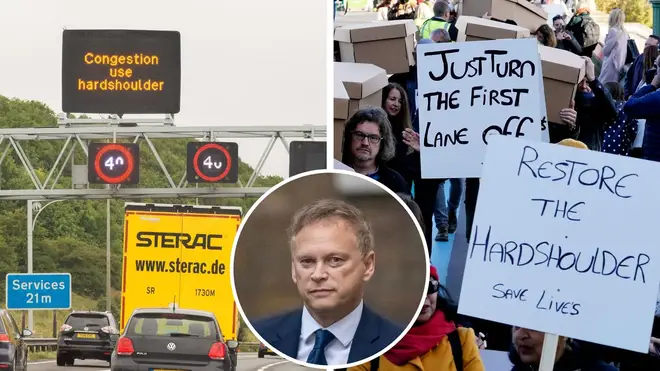
Ali Miraj 12pm - 3pm
2 November 2021, 00:27 | Updated: 2 November 2021, 01:40

Smart motorways should stop being rolled out until it is clear that they are safe, MPs have demanded.
A report by the Commons' Transport Select Committee (TSC) suggested more data was needed on the safety of the roads before more were built.
If the Government continues to ignore calls for smart motorways to be delayed, the committee warned it could lead to more motorists "at risk of death and serious injury".
The report said: "The Government and National Highways should pause the rollout of new all-lane running schemes until five years of safety and economic data is available for every all-lane running scheme introduced before 2020 and the implementation of the safety improvements in the Government's action plan has been independently evaluated."
The TSC went on to urge ministers to "consider alternative options for enhancing capacity" on the roads.
Read more: Drivers want hard shoulders to be reinstated on smart motorways, survey suggests
Read more: Smart motorways are an accident waiting to happen, caller tells LBC

Motoring journalist speaks to Iain Dale on smart motorway safety
It concluded: "The evidence suggests that doing so could put more drivers and passengers at risk of death and serious injury.
"The Government is right to focus on upgrading the safety of all-lane running motorways."
It comes after the Government decided in March 2020 that future smart motorways would be all-lane-running versions, meaning hard shoulder would instead be used as a live traffic lane.
The TSC called for the Department for Transport to instead "revisit the case" for controlled smart motorways, which only use the hard shoulder as a live traffic lane during busy, peak periods.
Read more: Smart motorways: Bereaved wife fighting to stop others suffering
Chair of the committee, Tory MP Huw Merriman, said the move was "too soon" with such limited evidence.
"Looking at the available evidence, smart motorways do appear to be safer than conventional motorways even once the hard shoulder is removed," he said.
"However, this evidence is also open to question. Only 29 miles of these all-lane running smart motorways have operated for over five years.
"It therefore feels too soon, and uncertain, to use this as an evidence base to remove the hard shoulder from swathes of our motorway network."
Relatives of those killed on smart motorways have called for the hard shoulder to be permanently reinstalled on roads.
The fatal incidents have caused increased concerns, with protesters marching on Parliament with coffins to draw attention to the growing issue.

Nick Ferrari confronts Grant Shapps over "death trap" smart motorways
However, a Department for Transport spokesperson said the Government was dedicated to making the motorways "as safe as possible".
"We welcome the Transport Committee's scrutiny and will now consider its recommendations in detail, providing a formal response in due course. This is a serious piece of work which we will engage with closely in the months ahead," they said.
"We're pleased that the TSC recognises that reinstating the hard shoulder on all all-lane running motorways could put more drivers and passengers at risk of death and serious injury and that we're right to focus on upgrading their safety, as the Secretary of State committed to doing when he became Transport Secretary.
"We recognise that improvements have not always been made as quickly as they could have been in the past, but as the committee has set out, the Transport Secretary is absolutely committed to making smart motorways as safe as possible, including committing £500 million on upgrades and the faster rollout of Stopped Vehicle Detection."
Smart motorways were first introduced in England in 2014 as a cheaper way of increasing capacity compared with widening carriageways.
There are about 375 miles of smart motorway in England, including 235 miles without a hard shoulder.